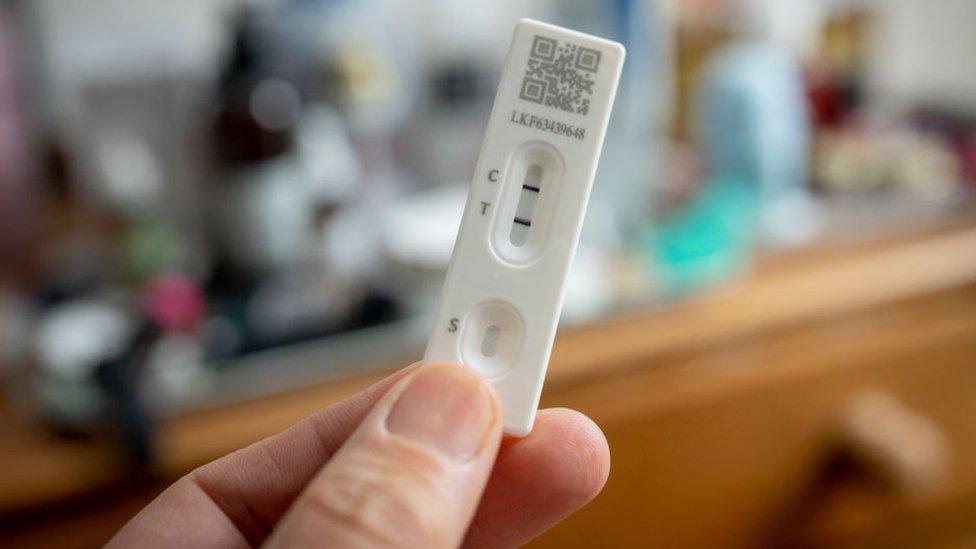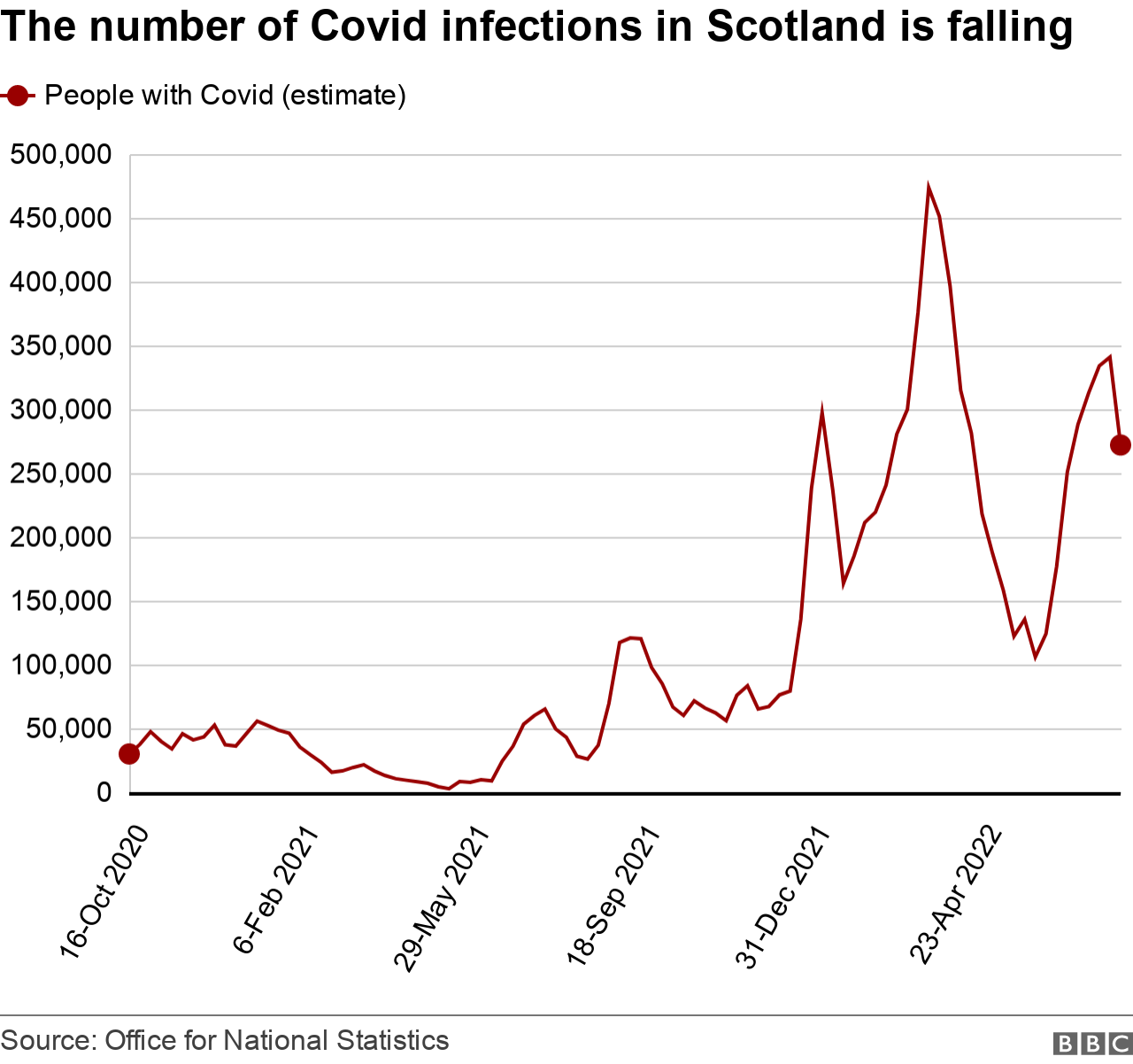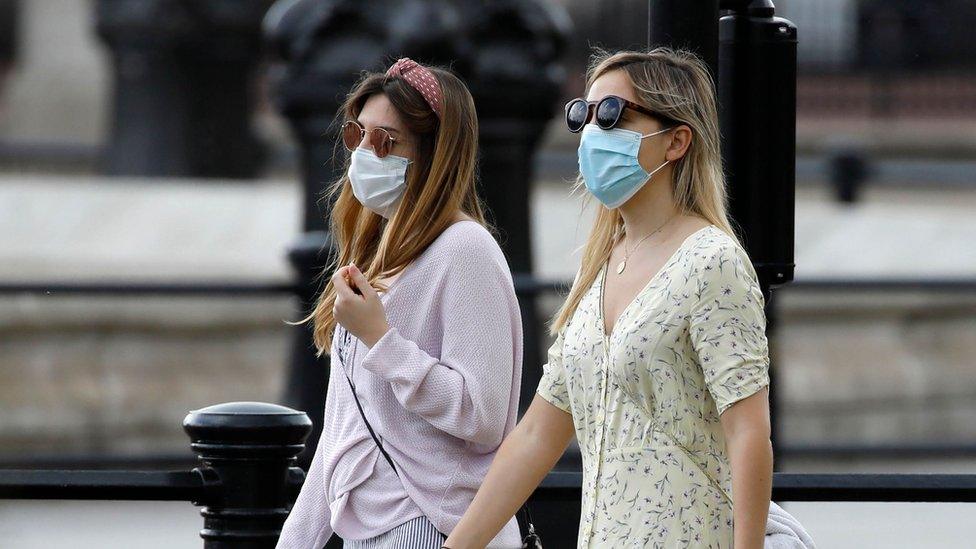Covid infection rate in Scotland starts to fall
- Published

The number of people estimated to have Covid in Scotland has fallen for the first time in eight weeks, according to the Office for National Statistics.
It said about one in 19 people would have tested positive for the virus last week, which was down from one in 15 the previous week.
The ONS said this was the equivalent of 272,000 people.
Covid rates have also started to fall in England and Wales after rising across the UK since the start of June.
An estimated one in 20 people had the virus in England last week, and one in 19 in Wales.
Scotland had seen its Covid rates rise during the previous seven weeks, with the country having had the highest rate in the UK for nine weeks in a row.
But the recent drop in Scottish cases has left Northern Ireland with the highest rate at one in 16, although the situation there was described in the latest ONS Coronavirus Infection Survey, external as "uncertain".
Hospital figures
In the week ending 24 July there were 31 new admissions to intensive care units with a laboratory confirmed test of Covid-19, an increase of five from the previous week.
There were, on average, 1,660 patients in hospital with Covid, a 6.3% decrease.
It is not known how many were being treated for Covid, or how many were receiving treatment for other conditions.
The new Public Health Scotland Covid-19 statistical report, external, published on Wednesday now quotes the ONS figure for case numbers rather than its usual figure for reported cases.

The ONS sampling is considered a better indicator than the PHS data as so few people are now reporting test results.
Meanwhile, the National Records of Scotland, external data shows there were 92 deaths involving Covid-19 in the week ending 24 July, eight more than the previous week.
Latest figures show there have been 15,274 deaths registered in Scotland where Covid-19 was mentioned on the death certificate.
Jillian Evans, head of health intelligence at NHS Grampian, told BBC Scotland's Drivetime programme she was "delighted" with the latest results.
'Peaked this wave'
"It certainly looks as if we've peaked this wave and things are certainly subsiding, not just in Scotland, but in England and Wales as well so that's really good," she said.
"I suppose we are breathing a sigh of relief now. My pessimistic view always says that decreasing prevalence of infection is not the same as low prevalence and it's still very high in our communities, but none the less, this is a positive sign in the right direction.
"It's actually quite a sharp decrease [in Scotland] this week. We're talking about one in 19 versus one in 15 last week. The changes were really small, week on week, they were nudging up one or two every week but now we are seeing quite a dramatic drop - and in England too, changing from one in 17 last week to one in 20.
"What's great about this is we know admissions are dropping in hospital which demonstrates to us that the impact is starting to be felt in wider situations."

Jillian Evans warned that this was unlikely to be the last wave of infections
She added that the proportion of people admitted to hospital severely ill due to Covid was quite small.
However, she said this was unlikely to be the last wave of infections, with new variants now emerging so there was "every reason to be as vigilant as we can to try to keep the levels down".
The current wave has been driven by the BA.5 Omicron subvariant, which is now the dominant form of Covid-19 in the UK.
High levels of coronavirus antibodies among the population - either from vaccination or previous infection - mean the number of people seriously ill or dying from the virus remains low.
Sarah Crofts, ONS head of analytical outputs for the Covid-19 Infection Survey, said: "Our most recent data suggest that we may now be over the peak of the latest wave of infections across the UK, although rates still remain among the highest seen during the course of the pandemic.
"We have seen welcome decreases among most parts of the UK and in all age groups. With summer holidays starting [in some parts of the UK] and more people travelling, we will continue to closely monitor the data."
Related topics
- Published22 July 2022
